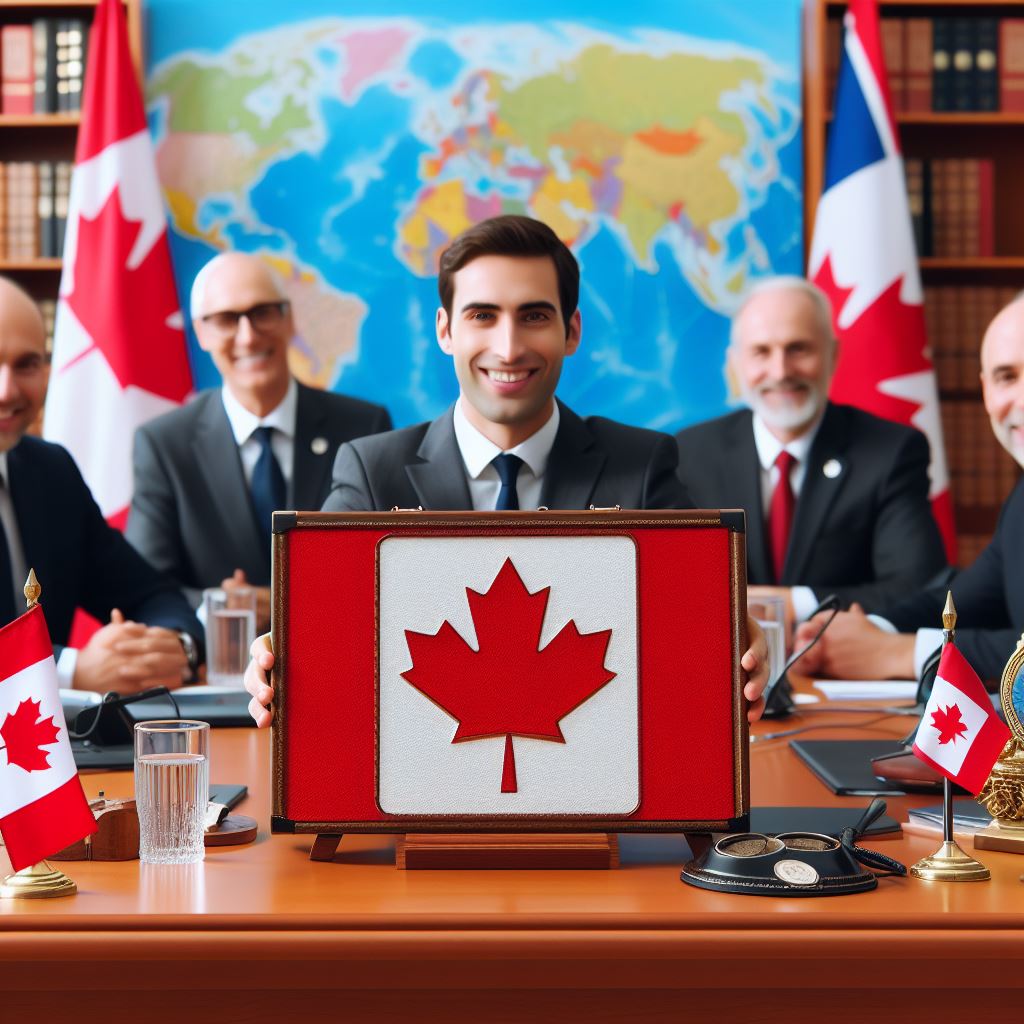Introduction
Diplomatic etiquette plays a vital role in international diplomacy.
It encompasses a set of formal rules and customs that govern the behavior of diplomats and officials in their interactions with foreign counterparts.
It is essential to have a proper understanding of diplomatic etiquette as it helps in fostering mutual respect and avoiding potential conflicts.
Understanding diplomatic etiquette is important because it helps diplomats navigate the complexities of international relationships.
By adhering to diplomatic protocols, they can ensure clear communication, demonstrate professionalism, and build trust and rapport with their counterparts.
It also enhances the image and reputation of their countries and paves the way for successful negotiations and collaborations.
In diplomatic circles, observing dos and don’ts is crucial. Some dos include addressing officials with their proper titles, respecting cultural differences, and being punctual for meetings and events.
On the other hand, there are several don’ts that one must avoid, such as displaying disrespect or aggression, disclosing confidential information, and making culturally insensitive remarks.
By adhering to these guidelines, diplomats can create a conducive atmosphere for fruitful discussions and negotiations.
They can facilitate diplomatic exchanges, resolve disputes, and promote understanding and cooperation between nations.
In short, diplomatic etiquette is an integral part of international diplomacy.
Understanding and adhering to its principles is essential for fostering positive diplomatic relations and achieving diplomatic objectives.
By observing the dos and avoiding the don’ts, diplomats can effectively navigate the complexities of diplomatic interactions and contribute to global peace and cooperation.
Read: The Role of Technology in Modern Policing
Dos of Diplomatic Etiquette
In the world of diplomacy, adhering to proper etiquette is essential for building and maintaining strong relationships between nations.
Diplomatic etiquette ensures that interactions are conducted respectfully, and it allows diplomats to effectively represent their countries on an international stage.
In this section, we will discuss the dos of diplomatic etiquette, focusing on key areas that are crucial for successful diplomacy.
Dress Appropriately
One of the fundamental aspects of diplomatic etiquette is dressing appropriately. It is essential to understand the significance of conservative attire in diplomatic settings.
Conservative attire not only conveys professionalism but also shows respect for the host country’s culture and values.
Dressing inappropriately can send the wrong message and create a negative impression.
To ensure appropriate clothing choices, it is vital to research cultural dress codes beforehand.
Different cultures have different expectations regarding clothing.
Understanding and respecting these expectations demonstrates cultural sensitivity and helps avoid potential misunderstandings or offenses.
Researching beforehand allows diplomats to make informed decisions and dress appropriately for each occasion.
Respect Cultural Differences
Respecting cultural differences is a cardinal rule in diplomatic etiquette.
Unlock Your Career Potential
Visualize a clear path to success with our tailored Career Consulting service. Personalized insights in just 1-3 days.
Get StartedDiplomats should be aware of the cultural norms and values of the countries they interact with.
This awareness helps diplomats adapt their behavior and avoid unintentionally causing offense or disrespect.
Furthermore, diplomats must avoid relying on stereotypes and generalizations about individuals from different cultures.
Each person is unique, and assuming everyone from a particular culture shares the same characteristics is not only inaccurate but also disrespectful.
Diplomats should approach individuals with an open mind and view their perspectives as valuable contributions to constructive dialogue.
Practice Active Listening
Active listening is a fundamental skill in diplomatic etiquette. Diplomats should show genuine interest in others’ perspectives and actively engage in conversations.
By actively listening, diplomats signal their respect for the opinions and ideas of others.
This allows for meaningful exchanges and paves the way for understanding and cooperation.
In addition to showing genuine interest, diplomats should avoid interrupting or speaking over others.
Interrupting can be interpreted as dismissive or disrespectful, hindering productive communication.
Allowing individuals to express their thoughts fully fosters an environment of inclusiveness and encourages diverse viewpoints.
Be Punctual and Respectful of Time
Punctuality and time management are highly valued in diplomatic circles. Being punctual means arriving on time for meetings and events.
It demonstrates respect for others’ time and shows a commitment to professionalism.
By honoring scheduled appointments, diplomats ensure that the diplomatic process runs smoothly.
Adhering to deadlines is another essential aspect of being respectful of time.
Meeting deadlines shows that diplomats can effectively manage their own responsibilities and are dependable partners in diplomatic endeavors.
Following through on commitments contributes to the overall success and credibility of diplomatic engagements.
Use Proper Greetings and Titles
Proper greetings and the use of appropriate titles play a significant role in diplomatic etiquette.
When interacting with individuals from different cultures, it is essential to understand cultural variations in greetings.
Different cultures may have specific greetings or customs that should be observed and respected.
Addressing individuals by their appropriate titles is also crucial. Diplomats must be aware of the proper titles used for different positions and ranks.
Using the appropriate titles shows respect and acknowledges the status and authority of the individuals being addressed.
By adhering to these dos of diplomatic etiquette, diplomats can navigate cross-cultural interactions with grace and effectiveness.
These etiquette practices contribute to building strong relationships, fostering understanding, and ultimately achieving successful diplomatic outcomes.
Read: The Evolution of Diplomacy: A Canadian View
See Related Content: Firefighting Tech Advancements in 2024
Don’ts of Diplomatic Etiquette
When engaging in diplomatic interactions, it is crucial to follow certain etiquette guidelines to maintain positive relationships and foster successful communication.
While diplomatic etiquette may seem complex, adhering to a few essential “don’ts” can greatly enhance your ability to navigate sensitive situations and build fruitful connections.
Avoid controversial topics
One crucial aspect of diplomatic etiquette is avoiding controversial topics.
To prevent unnecessary conflicts or tensions, it is important to steer clear of sensitive political issues.
By staying away from these potentially divisive subjects, you can create an environment that is conducive to positive dialogue and understanding.
Respecting cultural taboos and sensitivities also plays a significant role in diplomatic interactions. Different societies have their own unique customs and beliefs.
To avoid causing offense or discomfort, it is essential to familiarize yourself with the cultural norms of the individuals you are engaging with and show respect for their values.
Refrain from interrupting or dominating conversations
Interrupting or dominating conversations is another behavior to avoid when practicing diplomatic etiquette.
It is important to allow others to express their opinions fully and actively listen to their viewpoints.
By actively engaging in active listening and giving everyone an opportunity to contribute, you demonstrate respect and openness towards diverse perspectives.
Do not criticize or make negative remarks
Similarly, it is crucial to refrain from making negative remarks or criticizing others during diplomatic interactions.
Diplomacy requires maintaining professionalism and tact in communication.
Even if you disagree with someone, it is important to remain diplomatic and express your thoughts constructively, without resorting to personal attacks or insults.
Avoid excessive personal gestures
When it comes to personal gestures, it is vital to be mindful of cultural interpretations and norms.
Body language can vary greatly across different cultures, and certain gestures that may be acceptable in one culture could be considered inappropriate or offensive in another.
Understanding and respecting these cultural differences helps to create a comfortable and harmonious environment for diplomatic exchanges.
Overall, practicing the “don’ts” of diplomatic etiquette allows for smoother and more effective communication.
By avoiding controversial topics, refraining from dominating conversations, being diplomatic in your communication, and respecting cultural norms, you will be better equipped to navigate diplomatic interactions successfully.
Remember, diplomacy requires a delicate balance of cultural awareness, respect, and effective communication skills, which can be achieved by adhering to these essential guidelines.
Read: Canadian Embassies Around the World: A Look

Tips for Building Successful Diplomatic Relationships
Building successful diplomatic relationships requires a strategic approach that emphasizes effective communication, empathy, adaptability, and conflict resolution.
By implementing the following tips, diplomats and negotiators can significantly enhance their ability to foster positive relationships and achieve desired outcomes.
Show genuine interest and empathy
- Building rapport and trust with others: Diplomats should actively engage with their counterparts, demonstrating a sincere interest in their concerns and perspectives. This helps foster trust and enhances the chances of finding common ground.
- Expressing empathy during disagreements: Diplomatic interactions often involve disagreements. By demonstrating understanding and empathy, diplomats can reduce tensions and maintain a positive relationship even during challenging negotiations.
Nurture open and effective communication
- Active listening and clear communication: Diplomats must actively listen to others, seeking to understand their viewpoints and concerns. Clear and concise communication is vital to ensure messages are conveyed accurately and effectively.
- Encouraging dialogue and collaboration: Promoting open and constructive dialogue encourages the exchange of ideas, fosters understanding, and enhances the possibilities of reaching mutually beneficial agreements.
Adapt to different negotiation styles
- Understanding cultural approaches to negotiation: Different cultures have distinct negotiation styles and preferences. Diplomats need to familiarize themselves with these cultural nuances to adapt their strategies and approaches accordingly.
- Being flexible and adaptable in finding common ground: Embracing flexibility and adaptability allows diplomats to overcome cultural differences and find mutually acceptable solutions that satisfy the interests of all parties involved.
Resolve conflicts diplomatically
- Seeking compromise and win-win solutions: Diplomats should prioritize finding common ground and seeking compromises that satisfy the interests of all parties involved. This approach promotes harmony and long-term stability.
- Utilizing diplomatic channels for conflict resolution: When conflicts arise, diplomatic channels, such as mediation or arbitration, should be employed. These channels offer a neutral platform for resolution, minimizing hostilities and maximizing cooperation.
In a nutshell, building successful diplomatic relationships necessitates a combination of effective communication, empathy, adaptability, and conflict resolution skills.
By implementing the tips outlined above, diplomats can navigate disputes, foster understanding, and maintain positive relationships with their counterparts.
These qualities are essential for achieving sustainable and mutually beneficial outcomes in diplomatic negotiations.
Read: Diplomacy Training: What Does It Involve?
Conclusion
Understanding and adhering to the dos and don’ts of diplomatic etiquette are crucial for successful diplomatic interactions.
By following these guidelines, diplomats can build trust and strengthen relationships with their counterparts.
To recap, some important dos include conducting oneself professionally, respecting cultural differences, and being mindful of body language and non-verbal cues.
On the other hand, some key don’ts involve avoiding offensive or controversial topics, refraining from interrupting or dominating conversations, and refraining from public displays of aggression.
Mastering diplomatic etiquette is of utmost importance as it enhances one’s professional image and credibility.
It demonstrates respect for others and shows an individual’s ability to navigate complex diplomatic situations with tact and grace.
However, diplomatic etiquette is not a static skill. It requires continuous learning and practice.
Diplomats should stay updated on cultural norms, customs, and protocols of the countries they interact with. They should also seek feedback and guidance to refine their diplomatic skills.
By prioritizing diplomatic etiquette and continually honing their abilities, diplomats can foster smoother communication, resolve conflicts amicably, and contribute to successful international relations.




